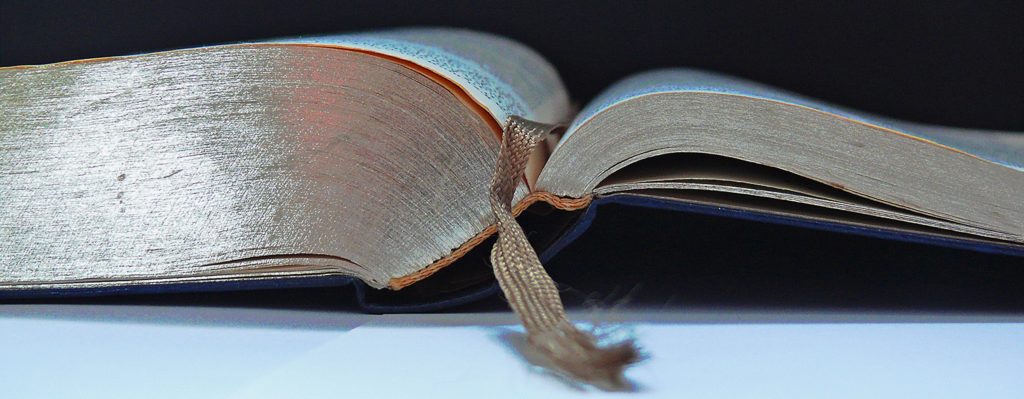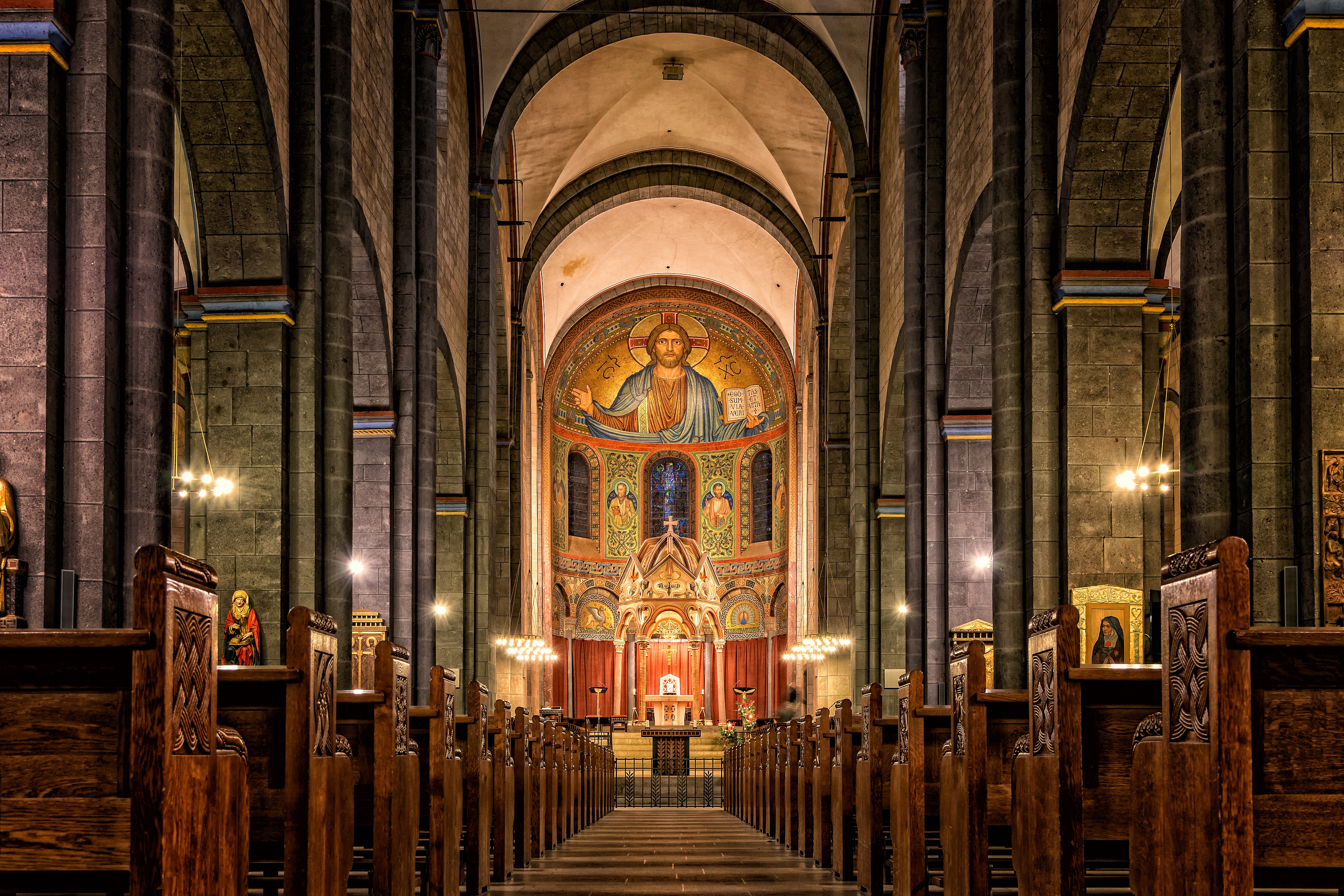Because there has been a clear movement for years that is breaking down the walls between Roman and Reformation, it is good to have a bit of clarity about what the Roman Church means. The site does have something written about it, especially about contemplation. We have never talked about the Mass (the Eucharist) and I don't feel the need to write a whole book about it.
Now last week I had to clean up some mess on the desk and then I came across an article about the Roman Mass. I had read it once and put some notes on it and now we have to devote a short blog to it.
The article is the account of a conversation between a pastor and a Protestant theologian[1] about the 'Eucharist'[2]. In that conversation, the Protestant tries to understand what the mass is about and to what extent it differs from Protestant views. The interview report, in its honesty, provides quite a bit of clarity as far as I'm concerned. We're just taking a few things from the conversation, as far as they have to do with our site's themes.
Sacrament: experience of the unification with God
The conversation (record) starts with the question about the sacrament; for the Mass (Eucharist) is one of the Roman sacraments. The answer is that God is a God who reveals himself. He does that in a way that we humans understand and He does that according to the Roman view in the Bible and in the sacraments.
“The Bible is God's Word in human words. Sacrament is grace in human signs. In both cases, the divine is anthropomorphized, either in audible or readable forms, or in visible forms and signs. Well, for us humans it is, thanks to God's revelationmade possible to hear, see, feel or taste God. The Bible and the sacraments are therefore both means of revelation from God on the one hand and means of salvation for man on the other. meeting points So."
So right at the beginning of the article, it is made clear that it is the Roman Catholic view that we can meet and experience God with the senses and especially in the sacraments. A little further on in the conversation, the pastor makes it clear that this experience of God is precisely the deepest at the Eucharist. He even experiences it as a 'unification with God" when he says
"This is the deepest revelation which now becomes reality here and now in the celebration of the Eucharist in anticipation of the eschatological unification in heavenGod willing.”
In other words, you can take those unification with God already experienced at the Eucharist now, but later in heaven it will be the perfect unification are (see, e.g. here).
It will be clear to the reader that we are dealing here with a conception and associated practice that the Bible calls 'idolatry'. The Bible forbids the people of God from using pagan practices in approaching God, since He is not perceptible to our senses. When believers nevertheless reach out to experience God physically, it is demons that will meet and deceive and influence man.
See further on the site what is written about idolatry and contemplation (for example here, here and here).
On this basis we can conclude that the daily center (the mass, which should actually be held daily) of the Roman church is a demonically inspired ritual that misleads people and brings them under demonic influence.
The mystical experience
It will undoubtedly be the case that some of the 'believers' present at the mass only experience the mass as a ritual without mystical inner experience. But others will undoubtedly enter a higher state of consciousness and indeed have this inner mystical experience; which, by the way, is also the purpose of the Eucharistic celebration.
What we have already seen elsewhere (eg with Ann Voskamp) is that the higher consciousness provides a deep inner experience of tranquility, peace and harmony with a completely different perception of reality. That is a situation where it is easy to mean, for example
(a) that you have a unification with God experience and
b) that the host is the actual body and blood of Christ.
In a state of higher consciousness, demons are able - coupled with great inner experiences - to make people believe all kinds of views (1 Timothy 4:1), including the ones mentioned here.
The interview report is partly about the 'transubstantiation', which is the transformation of bread and wine into the actual body and blood of Christ. It is a rather incomprehensible story, which the pastor himself then says is a 'everlasting mystery' is. Then we'll just leave it that way.
The Bible and the Eucharist
The quote from the beginning is repeated here because it shows something important about how people think about the Bible in relation to the sacraments.
“The Bible is God's Word in human words. Sacrament is grace in human signs. In both cases, the divine humanized, either in audible or readable forms, or in visible forms and signs. Well, for us humans it is, thanks to God's revelation, become possible to hear, see, feel or taste God. So the Bible and the sacraments are both means of revelation from God on the one hand and remedies for people on the other, so meeting points.”
The Bible and the sacrament are both seen as God's means of revelation, through which God makes himself known through man. To know in the sense of 'experience'. This means that you can (get to know) God by experiencing the Eucharist.

In any case, this undermines the position of Scripture. You could say that the Bible is relegated to the level of experience. As a result, the Bible is relativized and deprived of its authority. In that respect, it fits seamlessly into the postmodern thinking of our time.
once for all
Finally, the Mass also always involves the question of whether in doing so Christ is crucified again, yes or no. On the one hand, the Roman Church affirms that Christ died once for all; they will not deny that and in that respect they agree with the Protestants. But at the same time they find that that work of redemption is brought to man in the sacrament for him to experience.

“Yes, we Catholics too experience our flaws every day. And we need help and strength and grace, 'cause we can't do it on our own. God needs nothing more, for Christ died once and for all. But we humans are alive now (year 2010), and we want to feel and experience today, hear and see that Christ then died for us and is now redeeming us. Sacraments are there for us, adapted to our human senses. (…) But how should Christ's salvation come to us, if not through the Word and through the sacraments. (…) That is why we Catholics celebrate in the Eucharist the concrete presence of Christ, our savior here and nowbecause here and now I must be delivered
From statements like this, we can only conclude that Christ's work of redemption - though apparently accomplished "once for all" - continues for us humans in every Mass and is also "experienceable" for humans. The faithful actually notice in a mystical way that Christ is still doing that work of redemption for them; at least, that is how they think they should interpret the mystical experience.
By the way, I wonder - just in passing - if this might be the reason people in the Roman Church still use the crucifix, where Christ still hangs on the cross?
We can draw some conclusions
- In the Roman Catholic view, Christ's work of redemption is still not finished; He is still working on it. For the Roman believer, each time it is experienced mystically, it confirms him or her of the still ongoing work of redemption. But in so doing - no matter how you look at it - the once accomplished work of the Lord Jesus Christ on Calvary's cross is rejected.
- What is lacking in the Roman view is faith. After all, the whole Word of God must be believed and that also applies to Christ's work on the cross. I have to believe it's finished, if God's Word says so. Afterwards I will have to learn to live by that faith and that means precisely that I have to rely on God's Word and not on 'God experiences'.
Summarizing
If we would like to summarize the most important things, we come to the following.
- The Roman Church teaches that the redemptive work of Christ on Calvary has not yet been completed for humans and has yet to be followed by the 'daily work of redemption', the sacrifice of the mass. This removes 'Christ and Him crucified'.
- Living by faithFaith in the things that God has revealed in His Word has no place in the Roman church. Faith there is faith in the things that 'the church' teaches.
- This also means the Scriptures a subordinate place. Tradition and what the church teaches is ultimately the most important.
- Finally, the central activity of the (daily) Mass is a practice by which the faithful are subject to demonic influence come to stand. The mass is nothing more than a pagan ritual aimed at contact with the gods, using Christian symbols and words.
For this reason alone, the Roman Church is actually
nothing but a Babylonian idolatry
in a 'Christian' jacket.
[1] Martie Dieperink, see https://www.stucom.nl/document/0441.pdf
[2] You can read the article - "A Dialogue on the Eucharist" - here: https://www.stucom.nl/document/0437.pdf



